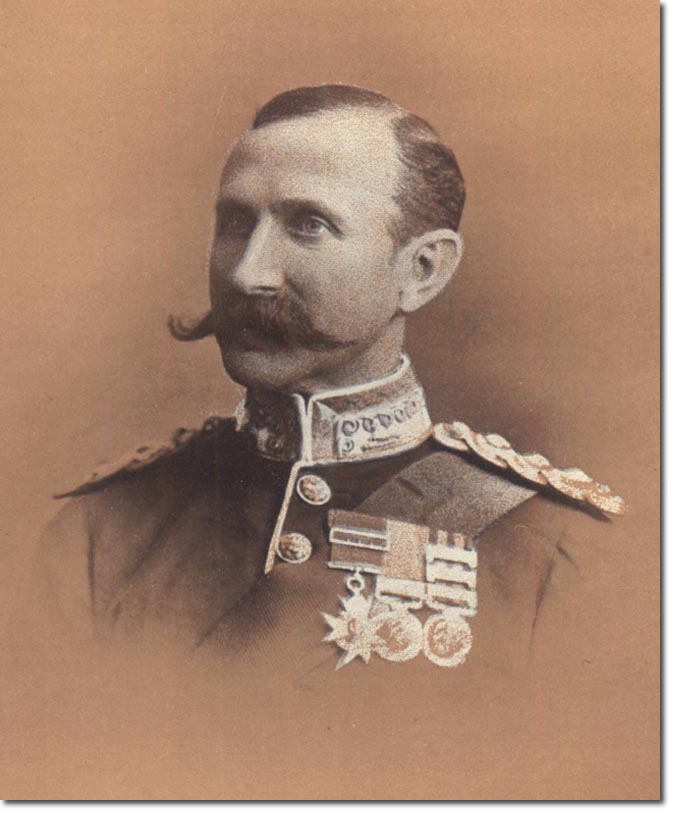|
|

 |
|
Penn Symons was a South Wales Borderer but he came from Saltash in Cornwall. The photo shows him in his regimental uniform. His career went from strength to strength after his spell as commanding officer of the 2nd Battalion, but it was cut short by a Boer bullet that killed him at Talana Hill near Ladysmith. He was in command of the Natal Field Force, as a colonel with the local rank of lieutenant-general, until the arrival of Sir George White. White concentrated his army at Ladysmith and sent Penn Symons with 4000 men a few mile northeast to Glencoe. One of his officers wrote home: "We are under an awfully nice General - one Penn Symons - a really good chap." The Boers approached the Glencoe camp from three directions but one of their columns moved in too early and formed a defensive position on nearby Talana Hill. On 20th October 1899 Penn Symons ordered the 1st KRRC, 2nd Dublin Fusiliers and the Royal Irish Fusiliers to storm the position. The General placed himself in a dangerous position to inspire the men but was shot in the stomach. He died three days later.
1843 Born He was one of the best shots in the army and he was on the Musketry Instruction Staff in India in 1893. He was an authority on Mounted Infantry, a keen sportsman and an excellent linguist. He was a well respected and popular officer, and he earned this obituary from Winston Churchill who wrote in the Morning Post: 'So Sir Penn Symons is killed! Well, no-one would have laid down his life more gladly in such a cause. Twenty years ago the merest chance saved him from the massacre at Isandhlwana, and Death promoted him in an afternoon from subaltern to senior captain. Thenceforward his rise was rapid. He commanded the First Division of the Tirah Expeditionary Force among the mountains with prudent skill. His brigades had no misfortunes; his rearguards came safely into camp. In the spring of 1898, when the army lay around Fort Jumrood, looking forward to a fresh campaign, I used often to meet him. Everyone talked of Symons, of his energy, of his jokes, of his enthusiasm. It was Symons who had built a racecourse on the stony plain; who had organised the Jumrood Spring Meeting; who won the principal event himself, to the delight of the private soldiers, with whom he was intensely popular; who, moreover, was to be first and foremost if the war with the tribes broke out again; and who was entrusted with much of the negotiations with their Jirgas. Dinner with Symons in the mud tower of Jumrood fort was an experience. The memory of many tales of sport and war remains. At the end the General would drink the old Peninsular toasts: "Our Men", "Our Women", "Our Religions", "Our Swords", "Ourselves", "Sweethearts and Wives", and "Absent Friends" - one for every night in the week. The night I dined it was "Our Men". May the State in her necessities find others like him!' |
Regimental details | Commanding Officers | Charles Orr's Memoirs
Armed Forces | Art and Culture | Articles | Biographies | Colonies | Discussion | Glossary | Home | Library | Links | Map Room | Sources and Media | Science and Technology | Search | Student Zone | Timelines | TV & Film | Wargames